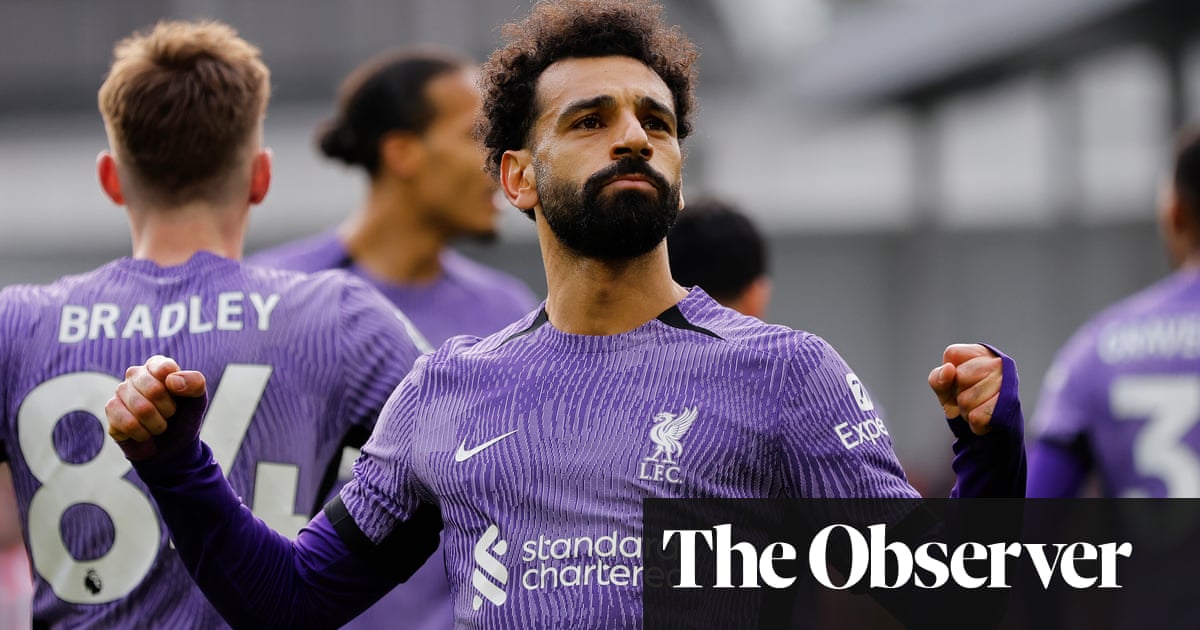
Star forward is "an icon of Egypt’s soft power"
Salah comes from the modest village of Nagrig in the Nile Delta
CAIRO: Patriotic statements, flashy commercials and an anti-drug campaign: Mohamed Salah’s dazzling displays for Liverpool have taken the football world by storm, and on his home turf in Egypt seemingly everyone wants a piece of him.
Salah has shot to stardom thanks to his goal-scoring exploits in England and Europe, and senior Egyptian officials increasingly refer to the player — although he has carefully steered clear of politics.
Last month foreign ministry spokesman Ahmed Abu Zeid went so far as to call him “an icon of Egypt’s soft power.”
Abu Zeid made the comment on Twitter after Salah scored a brace and set up two more goals as Liverpool beat AS Roma 5-2 in the Champions League semifinal first leg at Anfield last week.
The second leg takes place on Wednesday night in the Italian capital.
The remarkable game prompted President Abdel Fattah El-Sisi to also congratulate the flying forward.
“What he has accomplished calls for pride and affirms Egyptians’ capabilities in all fields... Proud of him every Egyptian who holds Egypt’s name high,” El-Sisi tweeted.
Salah the “Pharaoh” represents an opportunity for the country to improve its image internationally after years of turmoil in the aftermath of the 2011 uprising that toppled longtime ruler Hosni Mubarak.
The fact that “an athlete at that level penetrates the media wall and becomes a face known globally inevitably reflects... on his home country,” said Pascal Boniface, director of the French Institute for International and Strategic Affairs.
From the modest village of Nagrig in the Nile Delta, Salah has catapulted to worldwide fame since his arrival last summer in England from AS Roma in a transfer deal worth €42 million ($50.39 million).
Awards have since piled up, leading to talk of him challenging Cristiano Ronaldo and Lionel Messi for the 2018 Ballon d’Or, given to the world’s best player.
On April 22, Salah scooped the Professional Footballers’ Association player of the year for the 2017-18 Premier League season.
Salah also became a national hero for his leading role in helping Egypt to qualify for the World Cup for the first time in 28 years.
The competition kicks off on June 14 in Russia, and the eyes of all Egyptians are expected to be on him.
But Boniface remains skeptical of how successful attempts would be to use Salah politically on the international stage.
Such attempts would be “very exposed” and similar “to the old ways of propaganda,” he said.
On the other hand, the prodigy can give a significant boost to Egyptians’ “national self esteem,” he said.
In Egypt, images of President El-Sisi abound in public, with Salah the only other person coming close to having as many appear on advertising billboards, television screens and online.
Pictured alone or alongside his Egyptian or Liverpool teammates, Salah features prominently in adverts for a mobile telecoms company, a brand of soda or a local bank.
At the same time, he has publicly supported a campaign by the National Council for Women promoting gender equality, and appears in a government video for an anti-drug campaign.
The “You’re Stronger Than Drugs” campaign has increased the number of calls to the anti-drugs help line, according to the Ministry of Social Solidarity.
Efforts to turn such a big star into a symbol of soft power are not new, said Gamal Abdel-Gawad, a researcher at Al-Ahram Center for Political and Strategic Studies.
The greatest such symbol in Egypt remains Umm Kalthoum, the undisputed queen of Arab song, more than four decades after her death, he said.
But Salah’s overexposure could also now be a source of conflict.
An image rights controversy over the past few days has seen Salah lash out at Egyptian football authorities, causing a uproar on Twitter among his 5.36 million followers.
The dispute has centered on an advertising campaign by the national team’s main sponsor, Telecom Egypt’s mobile arm WE, which has relied heavily on photos of Salah, who has his own contract with global telecom giant Vodafone.
On Sunday, Salah signalled his growing frustration by tweeting “unfortunately the way it is being dealt with is very insulting. I was hoping the interaction would be classier than this.”
But a few hours later, after the issue trended on Twitter, he announced it was being resolved, while thanking his fans for their “unreal” support.












